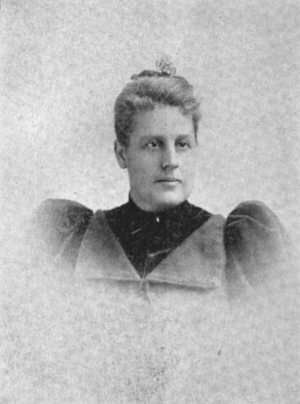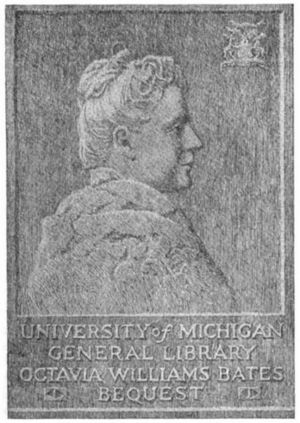Octavia Williams Bates facts for kids
Quick facts for kids
Octavia Williams Bates
|
|
|---|---|
 |
|
| Born | 1846 Detroit, Michigan, U.S. |
| Died | January 12, 1911 Baltimore, Maryland, U.S. |
| Occupation | suffragist, clubwoman, author |
| Alma mater | University of Michigan |
Octavia Williams Bates (1846 – January 12, 1911) was an American suffragist, a member of women's clubs, and an author. She worked hard to help women get better education and the right to vote. Bates was involved with more groups helping women than almost anyone else in Michigan, or even the whole U.S. She traveled across the U.S. and Canada. She was very interested in the women's right to vote movement.
In 1899, Bates visited Baltimore, Maryland, for a meeting. She loved the city so much that she decided to live there permanently.
Contents
Early Life and Education
Octavia Williams Bates was born in Detroit, Michigan, in 1846. Her parents were Samuel Gersham Bates and Rebecca (Williams) Bates. Her great-grandfather, Nathan Bucknam, fought in the American Revolutionary War. He was at the Battle of Bunker Hill and the siege of Boston.
Bates went to public schools in Detroit. She graduated from Detroit High School. In 1873, she started studying at the University of Michigan. She graduated in 1877. She later said that she expected college to be very hard. But she was determined to get a good education.
In 1894, Bates decided to study law at the University of Michigan. She joined the law class of 1896. She believed that understanding the law would help her manage her property. It would also make her work for women more effective. Her classmates quickly chose her as their vice-president.
Working for Women's Rights
Octavia Bates was a strong and dedicated worker for women's education and voting rights. She was connected to many organizations that supported these goals. She was a member of the Daughters of the American Revolution.
Bates was also on the board of directors for the Association for the Advancement of Woman. She served on the board of the General Federation of Woman's Clubs. This group had about 500 clubs and 40,000 to 50,000 women. She led the committee for foreign letters in this organization.
She was also part of the committee on dress for The National Council of Women. This large group had about 1,000,000 members. Bates was the president of The Detroit Woman's Club. She also led The Detroit Equal Suffrage Association. She was involved with many other clubs and societies.
World's Fair Contributions
Bates played a big role in the congresses at the World's Columbian Exposition in 1893. This event was also known as the Chicago World's Fair. She was especially active in the women's congresses. She represented Wayne County for Woman's Work.
She gave two speeches at the World's Congress of Representative Women. She also spoke at the Agricultural Congress and in the Woman's Building. Bates even read four other speeches for writers who could not attend. Her work at these congresses was very important and had a wide impact.
Her speeches covered topics like "Obstacles to Improved Dress" and "Ethics of Dress." She also spoke about "The New Municipal Suffrage Law for Woman in Michigan." Her paper "Club Life for Women on a Farm" was read at the Agricultural Congress.
Bates also read speeches for other important women. These included Belva Ann Lockwood and President Sarah Brown Ingersoll Cooper. She even read a paper for Baroness Thorborg Rappe from Sweden. This paper was about "The Progress of the Movement for Women in Sweden."
International Work and Writing
In 1899, Bates represented the U.S. at the International Congress of Women in London.
Besides her speeches, Bates was a well-known writer. She wrote for magazines and reviews of her time. Her work appeared in The Arena and other publications, especially those for women.
Personal Life in Baltimore
Bates moved to Baltimore, Maryland, in 1899. She came to speak at a meeting for the King's Daughters. She said she loved the city's friendly atmosphere and people. This is why she made Baltimore her home. She lived at the Mount Royal Apartments for many years.
She was a member of the Unitarian faith.
Legacy and Bequest
Octavia Williams Bates passed away at her home in Baltimore on January 12, 1911.
After her death, her brother, George William Bates, challenged her will. The case went to the Maryland Court of Appeals.
Bates left a generous gift to the University of Michigan Law Library. She also made the university's General Library the main heir to her estate. The money from this gift became available in 1915. The university used this money to buy books. They created a special bookplate to mark these books. The bookplate was designed by George Senseney. It honored Octavia Williams Bates's gift to the library.


